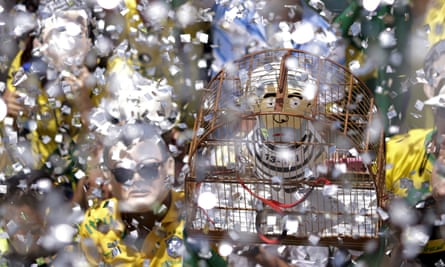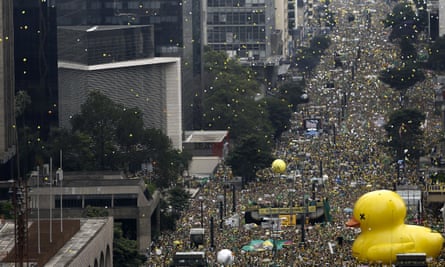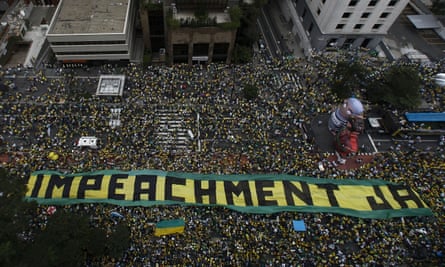More than a million Brazilians have joined anti-government rallies across the country, ramping up the pressure on embattled president Dilma Rousseff.
Already struggling with an impeachment challenge, the worst recession in a century and the biggest corruption scandal in Brazil’s history, the Workers party leader was given another reason to doubt she will complete her four-year term.
The demonstrations on Sunday – which reached all 26 states and the federal district – were expected to be bigger than similar rallies last year. The largest took place in São Paulo, where the polling company Datafolha estimated the crowd at 450,000, more than double the number it registered last year.

Organisers, police and local media calculated far greater numbers. According to police sources cited by Globo, 3.5 million people took part nationwide in 326 cites, including 100,000 in Brasilia and 70,000 in Curitiba. The exact figures are contested, but undeniably huge.
In Rio de Janeiro, dense crowds stretched along the beachfront from Copacabana to Leme, and organisers estimated there were as many as a million participants. Police had yet to provide figures, but it looked likely to exceed 100,000.
Many protesters wore the canary yellow shirts of the national football team, or draped themselves in the national flag. Others carried banners expressing anger at bribery scandals and economic woes.

Parents brought children, and some families wore matching “impeachment now” T-shirts. Neighbours travelled on public buses, chanting anti-Rousseff slogans.
“She’s a horror,” said Paulo Rodriguez, a 53-year-old businessman who came with his wife and daughter. “The Workers party is a horror. They’re a criminal organisation that is robbing state resources. They are destroying our country.”
Rodriguez’s primary frustration was with the economy. Sales at his crepe business were down 30% to 40% compared to last year, he said. Even though he believed opposition politicians were as crooked as those in government, he felt a change was needed.
“If Dilma goes, the currency will get stronger and confidence will return and people will start spending again,” he said.
Worryingly for Rousseff, some of the major protests were in former Workers Party strongholds in the north-east.
In Rio, the crowd was predominantly white, middle class and predisposed to supporting the opposition. Several of the more prominent figures who spoke from sound trucks had rightwing backgrounds.
Among them was Marcelo Itagiba, the city’s former state security secretary and ex-federal police superintendent, who has been investigated for ties with militias and was one of the inspirations for the gritty film Elite Squad 2.
Now a congressman with the opposition Brazilian Social Democratic party, he led chants of “Fora Dilma!” (“Dilma Out!”) from the top of a sound truck, and tried to shout down a critic by labeling him “Petista” (a Workers party supporter).

But compared to last year, the extreme right was less in evidence in Copacabana. The crowd also appeared more diverse.
“It’s not just the rich. Everyone is suffering,” said house cleaner Claudia Brasilina, who had travelled almost an hour to get to the protest from her home in the poor suburb of São Cristovão. “Dilma is ruining the country. She has to go.”
Like many of the demonstrators, she put her hopes not in the opposition but in the judiciary, particularly judge Sergio Moro, who has presided over the Lava Jato investigation into the kickbacks and bribes associated with Petrobras, the state-run oil company.
That case has spread to involve dozens of other companies and senior politicians from almost all of the major parties. A popular chant on Sunday was “Viva o Sérgio Moro! Viva a Lava Jato!”

Rousseff has not been implicated, but several close aides are either in prison or under investigation. For the protesters, she is tainted by association.
“At the very least, she is guilty of incompetence and arrogance,” read one placard. “Dilma: Institutionalising Corruption 2010-2016” said another. Many others called for her to be impeached.
Congress is debating whether the president should be removed on a separate allegation, of window-dressing government accounts ahead of the election in 2014. The legal basis for this challenge is weak, however, and the man leading the charge, speaker Eduardo Cunha, is himself under investigation for bribery.
But the political winds are blowing hard against the president. The biggest party in her coalition has said it will decide within 30 days whether to quit the government coalition.
Later this week, Rousseff supporters will stage a rally against what they see as a judicial coup, but allies are becoming harder to find.
Several protesters on Sunday said they had previously voted for the Workers Party, which came to power in 2002 with a promise to clean up Brazilian politics. The economic downturn and corruption scandals have turned many former supporters away.
“I voted for Lula, but now I think he is a thief,” said systems analyst Barbara Santos, referring to an ongoing investigation into claims that the former president received illicit benefits from construction companies.
“People are angry. We’ve had it up to here. Dilma needs to fall so we can have a new government. Right now all we have is drift. It’s hopeless.”
Comments (…)
Sign in or create your Guardian account to join the discussion